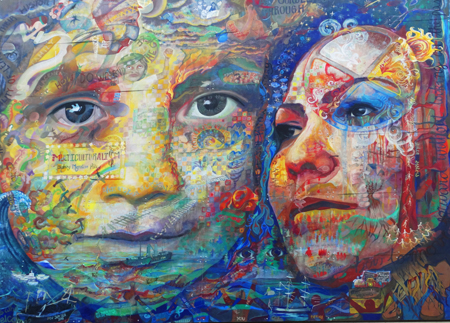Michael Fitzpatrick is a parishioner at St. Mark's Episcopal Church in Palo Alto, CA. After growing up in the rural northwest, he served over five years in the U. S. Army as a Chaplain's Assistant, including two deployments to Iraq. After completing his military service, Michael has done graduate work in literature and philosophy. He is now finishing his PhD at Stanford University.
Last month we discerned how the Christian life is lived in response to God’s love as displayed in the death and resurrection of Jesus. We treat others not by what they deserve or who they are, but by how God has first treated us. Our response to Christ further shapes how as Christians we are to participate in matters of politics and justice. Recall the story I shared last month about my friend who couldn't see what her faith had to do with her social justice work. In this month’s article, let’s see if we can’t give her a sound answer, a response that we can take into our own involvement in elections, policy-making, and issues of justice that affect our communities.
Politics concerns our social engagement as humans with our neighbors, and with the governments and laws that give society its shape. Yet as Christians we cannot exclude God from our political relationships. Our basic orientation remains determined by what God has done for us: “God demonstrates his own love for us . . . While we were still sinners, Christ died for us” (Rom. 5.8). If our ethical attitude is one of response to God’s loving actions, our political attitude must be one of evangelism: living and proclaiming the Good News of God’s loving actions to a world in need of good news. As such, our primary political status is not as citizens of earthly nations, but as citizens in God’s Kingdom, living for that day when God’s love is what unites humans together (Eph. 2.19-22). The aim of a Christian politics looks something like this:
We are to do all things for the sake of the Good News of Jesus Christ, being all things to all people, living at peace with everyone, and caring for the least among us.
 |
Our primary engagement with society is as evangelists bringing the Good News to every person around us. We were once people without hope, without good news, but now we have been given the Good News (1 Peter 2.10). In response we are to share the Good News we have been given as widely as possible (Col 1.23). As God has given unto us, so we give unto others. In our evangelism, we are to proclaim the Good News to every person without exception: every tribe, tongue, people, and nation (Rev. 14.6). There can be no distinction—Jesus is for all (Rev. 5.9; Eph. 3.6). Identities have no place anymore. It does not matter what race someone is, or what country they come from, or who they vote for. All have sinned and fallen short of the glory of God (Rom. 3.23), but thanks to our Lord Jesus, the promise of blessing for all nations given to Abraham (Gal. 3.8) has now come to all people (Eph 2.11-22). There is neither circumcised nor uncircumcised, Jew nor Greek, male nor female, for all are one in Christ Jesus who unite their selves with him (Gal. 3.28, Col. 3.11).
The political consequence is that Christians only recognize two basic categories within human society: those who have found Good News in Jesus, and those who have not yet found Good News in Jesus. Beyond this difference there is no difference. Nonetheless, for the sake of this Good News, we are to become “all things to all people” (1 Cor. 9.22), embracing earthly identities so as to speak the Gospel in the language of the communities we live within. To be all things to all people, we use whatever culture and language we encounter around us, and translate the Gospel into that culture and language so that Christ can appear as both judge and savior for every community. All human societies fall short of the standards of God’s Kingdom, but thanks be to God that it is Christ who transforms us and prepares us for the Kingdom!
Why focus on evangelism, rather than protest or social action as the first line of Christian politics? Because to follow Jesus is to believe that God’s act of salvation in Christ at the cross and the empty tomb is the final political hope for human society. It is to sing with Mary the Magnificat that in Jesus the proud are scattered, rulers are brought down from their seats of power, the humble are honored, the hungry are given good things to eat, the rich are sent away empty (Luke 1.46-55). It is to pray with Jesus his proclamation that in him is Good News for the poor, sight for the blind, freedom for the oppressed, restoration for those in prison, and the fullness of God’s mercy poured out on the world (Luke 4.17-19). To follow Jesus is to recognize that, for Christians, there is no final hope in a particular institution of government or placing particular leaders in positions of power. Why would we call on a president or prime minister to save us? Scripture reveals God admonishing such misplaced hope: “Where is your king, that he may save you? Where are your rulers in all your towns, of whom you said, ‘Give me a king and princes’?” (Hosea 13.10).
 |
Even when the surrounding culture attacks us for our faith (even now Christians around the world are murdered for their religious identity), Christians do not seek political power from earthly governments to advance our own interests (Phil. 3.17-21). Why would we seek earthly power when “the Lord Almighty is with us; the God of Jacob is our fortress” (Ps. 46.7)? We are to trust in the Lord, who alone can save (Is. 43.11). God does use earthly governments to protect the vulnerable and the persecuted, but the Christian sees the hand of God in such action. St. Paul writes, “If God is for us, who can be against us? ... It is God who justifies. Who then is there to condemn? No one” (Rom. 8.31,34). We have no fear of persecution from the culture around us, and we must not retaliate against it. “On the contrary, we put up with anything rather than hinder the gospel of Christ” (1 Cor. 9.12). For the sake of the Gospel, we bear all things in love, praying and believing that the more we live out the Gospel in truth before the culture, the more the Gospel will change the culture.
When it comes to government and rulers, we have but one Lord, and the Kingdom of God is the sole political identity we bear. “Our citizenship is in heaven,” St. Paul writes (Phil. 3.20). “Consequently, you are no longer foreigners and strangers, but fellow citizens with God’s people and also members of his household, built on the foundation of the apostles and prophets, with Christ Jesus himself as the chief cornerstone” (Eph. 2.19-20). To those who are political refugees without a home, what tremendous hope is this that God provides a home for all in God’s Kingdom! Our hope is not in temporal governments. Nonetheless, we are to judge the actions of governments around us by the standards of God’s Kingdom. “I know that the Lord secures justice for the poor and upholds the cause of the needy,” the Psalmist cries (140.12). Jeremiah 22 is a profound denunciation by God against wicked rulers who abuse their positions of power. The Christian advocates for even the least of our neighbors, serving them as Christ himself (Matt. 25).
Thus, Christians are both set apart from earthly government and yet passionate advocates for the kind of justice that will be realized in God’s Kingdom, when “the leopard will lie down with the foal” (Is. 11.6), where “there will be no more death or mourning or crying or pain, for the old order of things has passed away” (Rev. 21.4). It's true that scripture calls us to respect the laws of the earthly society we find ourselves in, and obey its rulers, if they live up to God’s standard of justice (1 Peter 2.13-14). St. Paul says much the same in Romans 13.1-7. But this obedience is never to honor the rulers or the laws of a society for their own sake. Rather, we are to “live at peace with everyone” (Rom. 12.18) for the sake of the Gospel. We live good lives, respecting the laws and being good neighbors so that the Holy Spirit can use our decency as witness to the hope that we have through Jesus (1 Peter 2.12). St. Peter acknowledges that we are free people, not subject to any earthly authority. But because we are “God’s slaves” (v. 16), we are to respect everyone else, and even “honor the emperor,” because it is by such a life that we make the Gospel appealing.
“Honoring the emperor,” and St. Paul’s comments in Romans 13.1-7 are not a blanket statement to honor all rulers. Consider God’s own judgments of King Ahab (1 Kings 22), Queen Jezebel (1 Kings 21), or King Saul (1 Samuel 15.22-26). When Shadrach, Meshach, and Abednego refuse to bow before King Nebuchadnezzar's statue, it’s because their citizenship and loyalty lie with the one true God (Daniel 3). They were foreigners and exiles, literally and spiritually. The Bible is full of stories of refusing the rule of those in power when they fail to live up to God’s standard for justice. As St. Paul says, God ordains rulers for the purpose of commending what is good and carrying out judgment on what is evil (Rom 13.3-4). When they cease to uphold justice, when God judges us that “your rulers are rebels, partners with thieves; they all love bribes and chase after gifts; they do not defend the cause of the fatherless; the widow’s case does not come before them” (Is. 14.23), then we must stand with the Kingdom of God against unjust rulers. We do so as citizens of the Kingdom working for the Kingdom.
 |
Can a corrupt throne be allied with you—
a throne that brings on misery by its decrees?
The wicked band together against the righteous
and condemn the innocent to death.
But the Lord has become my fortress,
and my God the rock in whom I take refuge. (Psalm 94.20-22)
What does our faith have to do with social justice? Everything. The justice we hope for will only come in final form when God finishes ushering in the Kingdom, where “each person shall sit under their own vine and their own fig tree, and no one shall make them feel afraid anymore” (Micah 4.4). As Christians we are already citizens of the Kingdom, and we live in it and for it now in our advocacy and service of our neighbors and our judgment of our rulers. Our heavenly citizenship makes us foreigners and refugees in every earthly society, and therefore passionate advocates for foreigners and refugees who need the Good News that God has a home for them. We have no vested interest in establishing earthly power; we care only “that every tongue should confess that Jesus Christ is Lord” (Phil 2.9-11). We are ambassadors of God’s Kingdom, proclaiming reconciliation to all who long for the love that will never evaporate, the righteousness that will never corrupt, the good shepherd who always brings the lost lamb home.
Michael Fitzpatrick welcomes comments and questions via m.c.fitzpatrick@outlook.com
Image credits: (1) Cindy Knoke; (2) Lewis Center for Church Leadership; and (3) NPR.



